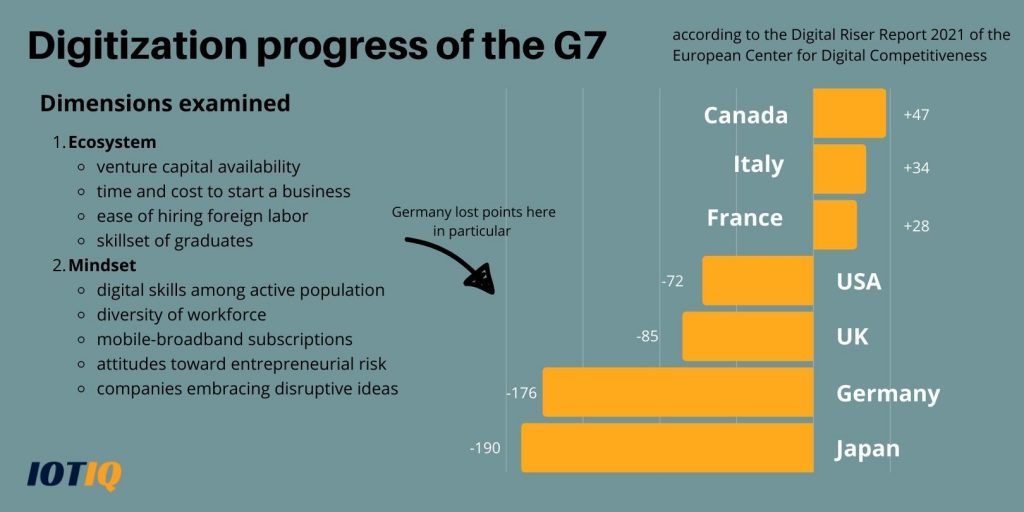For years, Germany has been considered the digital laggard. What can be observed on a small scale, such as mountains of paper that are still being shuffled back and forth or appointments with authorities that have to be attended in person, has repercussions on a large scale. Magazine Focus, for example, wrote that Germany had relegated itself from an industrial leader to a digital follower, and the Süddeutsche denounced years of anti-digital attitudes in politics that were in the process of catapulting us into digital (and economic) extinction.
On our blog, we have already addressed the question of why digitalization in Germany is progressing so slowly. In this article, we explain how lengthy bureaucratic processes and a lack of funding for startups are hampering startups and hindering innovation. In addition, the education system has failed to move with the times and teach the increasingly important digital skills. Instead, there has been too much reliance on students either acquiring the relevant skills outside of school or bringing them along 'innately,' as they belong to a generation that most consider to be digital natives.
Do employees lack digital skills or does management lack ambition?
However, this attribution is based solely on the fact that the younger generations have grown up with the Internet. The assumption that this automatically means they know how to handle new technologies with confidence, or even that they have in-depth knowledge across the board beyond their everyday knowledge, is a fallacy. Although dealing with technology is part of the everyday reality for most young people, digital skills still have to be taught. They do not simply develop on their own.
The lack of digital competence among employees is often cited as a reason when the hesitant digitalization of companies is discussed. In a study, 30% of the companies surveyed stated that a lack of skilled workers with digital skills was an obstacle to digital transformation.
The lack of knowledge among employees is often talked about as if it were an unchangeable factor to which everything else must be subjected. And of course, the needs of employees must be taken into account - through targeted training and continuing education to learn how to use new technology. But not by putting the digital transformation on hold due to the (supposedly) insufficient digital competence of employees - and possibly sleeping through it in the end. It's simply not enough to complain that the education system is producing too few 'digital minds'. That may be the case, but the time to wait for that to change is simply not there. (In this article, we discussed the hurdles to digitalization for small and midsize businesses in more detail).
But perhaps this finger-pointing is just an easy way to justify one's own inertia to innovate. After all, there is still very little empirical knowledge about digitalization, the consequences are sometimes difficult to foresee, and uncertainty is high. And where players are uncertain, there is a growing tendency to safeguard what has already been achieved and to preserve what already exists. This then leads to technologies being used as part of the 'digitization process' in a company to speed up existing routines or make minimal improvements. By contrast, fundamental changes that not only digitize processes, but significantly change them, that are departure rather than improvement, tend not to be pursued. Whether they are deliberately avoided or not recognized as an option at all is difficult to say.
The German focus on risks of digitization
This also has to do with the prevailing attitude toward digitization in Germany. The tenor is now that digitalization is important and that something needs to be done slowly to avoid being left behind completely. Nevertheless, the dangers and risks of digitalization are very present in the public debate. This is justified, because there is no denying that opening up the digital world also brings new challenges. These range from concerns about manipulation through fake news or the easier attackability of essential infrastructures to very personal concerns, such as surveillance and the misuse of personal data. In any case, data protection is often problematized in connection with digitalization and cited as a reason for German reticence. And, of course, the issue should be taken seriously. However, claims about data security cannot adequately explain the delays observed in this country. After all, the GDPR essentially applies to all other EU countries as well.


